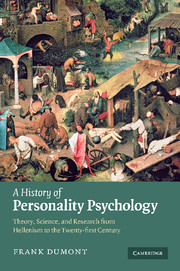 A History of Personality Psychology
A History of Personality Psychology Book contents
- Frontmatter
- Contents
- List of tables and figures
- Preface
- 1 Historical precursors of personality theory
- 2 From illness to wellness models of human nature
- 3 Developmental perspectives on personality: from youth-based to life-span models
- 4 The biology of personality
- 5 Trait theories and the psychology of individual differences
- 6 The puzzle of the self
- 7 Culture and personality
- 8 Gendered personality
- 9 Emotions and reasoning: a definition of the Human
- 10 Taking the measure of the Human: benefits and inherent limitations of personality measures
- 11 Can personality change? The possibilities of psychotherapeutics
- 12 The disordered personality: evolution of nosological systems
- 13 Eight appendices: at the margins of personality psychology
- References
- Author index
- Subject index
11 - Can personality change? The possibilities of psychotherapeutics
Published online by Cambridge University Press: 03 May 2010
- Frontmatter
- Contents
- List of tables and figures
- Preface
- 1 Historical precursors of personality theory
- 2 From illness to wellness models of human nature
- 3 Developmental perspectives on personality: from youth-based to life-span models
- 4 The biology of personality
- 5 Trait theories and the psychology of individual differences
- 6 The puzzle of the self
- 7 Culture and personality
- 8 Gendered personality
- 9 Emotions and reasoning: a definition of the Human
- 10 Taking the measure of the Human: benefits and inherent limitations of personality measures
- 11 Can personality change? The possibilities of psychotherapeutics
- 12 The disordered personality: evolution of nosological systems
- 13 Eight appendices: at the margins of personality psychology
- References
- Author index
- Subject index
Summary
Your patient is one person today, quite another person tomorrow, and still another person next week, next month, next year. Five years from now, ten and twenty years from now, he is yet another person. We all have a certain general background, that is true, but we are different persons each day that we live.
Milton H. EricksonIt is easier to act yourself into a new way of thinking than to think yourself into a new way of acting.
O. Hobart MowrerDefining the question
Before people address the subject of altering and ameliorating personality, they need to establish that personality change is even possible. Scientists, students, and lay people have repeatedly asked the question: barring serious brain lesions and disease, can an individual's personality change in more than a superficial sense? Answers have varied depending largely on (a) how broad a definition of personality one uses and (b) the scientific lens through which personality is examined. The answers most often heard start off in the affirmative. Some developmental psychologists will answer, “Of course personality changes. After all, personality is the product of numerous interactions between a changing body and a changing environment. As they both change so does one's psyche.” Others would answer, “If you accept that no one is born with a personality, you must conclude that humans either acquire it spontaneously and fully effloresced at some moment in time (hardly likely) or that its development is a gradual and largely contingency-based process.
- Type
- Chapter
- Information
- A History of Personality PsychologyTheory, Science, and Research from Hellenism to the Twenty-First Century, pp. 371 - 406Publisher: Cambridge University PressPrint publication year: 2010


